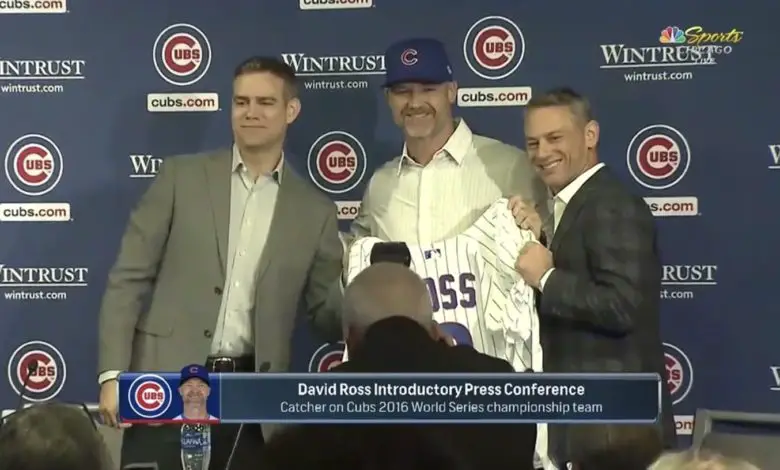
David Ross Stresses Accountability to ‘Winning Ways’ During Introductory Press Conference
David Ross didn’t offer to buy every member of the media a shot and a beer at the conclusion of Monday’s press conference, but he should end up earning fairly high marks in various columns nonetheless. While far from dynamic, the 55th manager in Cubs franchise history stuck to his primary talking points and reiterated a desire to bring the team back to the high levels of performance and engagement evident during his time as a player
Ross explained that his primary goal is to foster an environment of respect, trust, commitment, effort, hard work, and accountability by maintaining a focus on “winning ways.” Rather than resting comfortably on the winning itself, Ross stressed a desire to focus on all the little behaviors and attitudes that went into creating that success.
“I’ve been a part of winning a lot in my career, not just here in Chicago in 2016,” Ross explained. “I’ve been a part of winning almost my entire life and I know what that looks like.”
He also knows what losing looks like, and that’s where the accountability and communication come in. Those were the two primary themes of the conversation, and removing either word from the discourse probably would have reduced Ross’s responses by roughly 37 percent. Rather than being a matter of not having much to say, Ross was intent on what he wants to get done and just didn’t care to get florid in his descriptions.
“I’ve had an eye on this my entire career and I took the last three years to prepare for this moment,” Ross said of his new role.
Much of that came from getting a different perspective of the game from his time as a broadcaster with ESPN and as a special assistant in the Cubs’ front office. Not only did Ross get to see how different teams are built and how various players go about their business, he gained new insight into the behind-the-scenes work in scouting and analytics that players don’t normally pay attention to.
Always an inquisitive player, Ross said he’d actually been preparing to be a manager from the time he first got to the big leagues. Though he may not have always been conscious of that desire, he sought to learn more about the hows and whys beyond just what his own role may have called for. He knows that will be tested once the games start, which is why his coaching staff will be so important.
“The in-game stuff is going to take me a minute and it’ll be important that my bench coach is a step ahead of me,” Ross admitted.
That’s something we addressed in a not-so-serious manner last week, but the idea that Ross will want some experience to balance out his own deficiencies holds true. Even if Rob Manfred thinks the game moves too slowly, decisions need to be made on the fly when it comes to pitching changes or pinch hitters. Intuition only goes so far, so a little help is always a good thing.
Though he declined to offer any specifics on his bench coach or other positions, Ross said he’d begun the process of reaching out to current staff members as he gets settled in the new role. Establishing those relationships with his staff will be just as important as getting to know his players, since they’ll be responsible for maintaining his vision of accountability when he’s busy with managerial duties.
But that doesn’t mean Ross is going to need enforcers because he’s just a big ol’ softie. As obvious as it should be to anyone who was really paying attention during his playing career, his exploits on Dancing with the Stars and during the Little League World Series have created a recency bias that have many forgetting who this guy really is.
“There’s a fun-loving theme, but ask any friends and I didn’t shy away from the tough conversations,” Ross said. “Those conversations (on the mound) with (Jon) Lester were rarely friendly. I have a lot of expectations when I come into work, I expect professionalism.
“The ‘Grandpa Rossy’ thing is a little overblown.”
Theo Epstein took care to address another fallacy, which is that Ross was hired because the front office would be able to dictate everything he does. Citing an instance in which the catcher pushed back hard when presented with suggestions on how he could better handle a young pitcher, Epstein talked about Ross’s ability to use both data and experience to make decisions on the field.
“If you’re a front office and you want a puppet, you don’t hire David Ross,” Epstein declared. “He is absolutely his own man. I’m looking forward to partnering with him, but I don’t expect a yes-man in the least”
That same skill eventually helped to win Ross the job, even if he was the favorite all along. His first interview was almost a reunion, with smiles and a coffee run, but the second sit-down was decidedly different. Members of the front office presented Ross with loads of information and then asked him to apply it in real-time to various different game situations.
“We put it to him in that second interview and he dominated that day,” Epstein said.
Now the real work begins, as Ross has to put his words into action and make sure that his plans for accountability don’t fall as flat as Epstein’s calls for urgency that served only to create an echo chamber this past season. Though they never really admitted it publicly, a big part of the reason Maddon is gone is that the front office met too much resistance when it came to implementing their vision in the clubhouse.
The “winner’s trap” of the past was created by a front office that failed to adapt and a staff that may not have properly adjusted expectations. By focusing on the ingredients of winning, rather than the winning itself, Ross believes he’ll be able to get the Cubs back to the top.
“I want to stay true to who I am,” Ross said. “Those guys responded to me as a player, I think that will be the same as a manager.”

